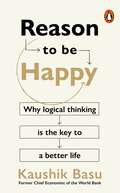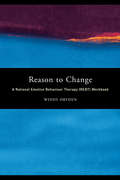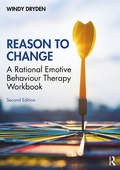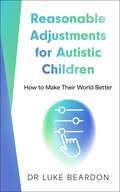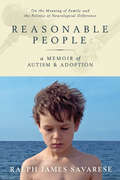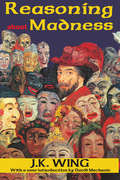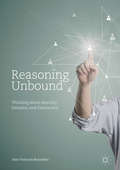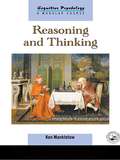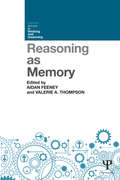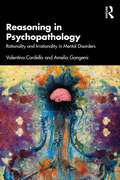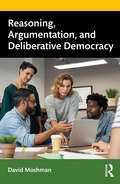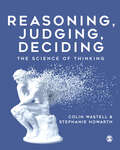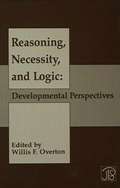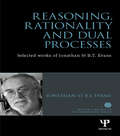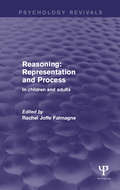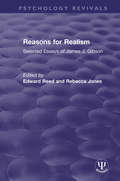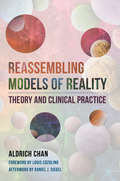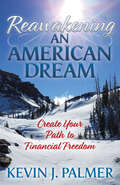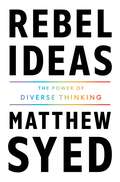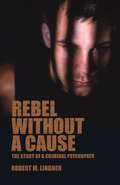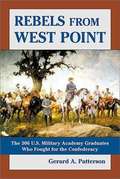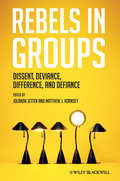- Table View
- List View
Reason to Be Happy: Why logical thinking is the key to a better life
by Kaushik Basu'Reason to Be Happy is a wise and witty book that shows how thinking clearly can help us find happiness in our daily lives, get more of what we want, and even make the world a better place' Hannah FryWhy do our friends have more friends than we do? How do you book the best available seats on a plane? And if jogging for ten minutes adds eight minutes to our life expectancy, should we still go jogging?The ability to reason is one of our most undervalued skills. In everyday life, the key is to put yourself in the shoes of a clever competitor and think about how they might respond. Whether you are dealing with events on the scale of the Cuban missile crisis or letting go of anger, leading economist Professor Kaushik Basu shows how game theory - the logic of social situations - can help us achieve better outcomes and lasting happiness.Full of fascinating thought experiments and puzzles, Reason to Be Happy is a paean to the power of rationality. If you want to have a good life and even make the world a better place, you can start by thinking clearly.
Reason to Change: A Rational Emotive Behaviour Therapy (REBT) Workbook
by Windy DrydenRational Emotive Behaviour Therapy (REBT) is an approach to counselling and psychotherapy in which great emphasis is placed on how emotional problems can be caused by the role of thoughts, beliefs and behaviour. However, no book before has taught the skills needed to use this therapeutic approach in practice in a thorough and accessible way.Reason to Change is the first workbook which teaches the practical skills of REBT. Each skill is explained in detail, and examples are given of how each skill can be put into practice. These skills include:* developing a problem list and setting goals* choosing a target problem and assessing a specific example* questioning beliefs* dealing with your doubts, reservations and objections * taking action.By using these skills in an active way, it can be possible to overcome emotional problems such as anxiety, depression, shame, guilt, hurt, unhealthy anger, unhealthy jealousy and unhealthy envy. This book can be used by people on their own, and by those who are consulting an REBT therapist. It will also be of interest to therapists and counsellors.
Reason to Change: A Rational Emotive Behaviour Therapy Workbook 2nd edition
by Windy DrydenRational Emotive Behaviour Therapy (REBT) is an approach to counselling and psychotherapy in which great emphasis is placed on how attitudes are at the root of emotional problems and their solution. The first edition of Reason to Change was written as a one-of-a-kind workbook teaching the practical skills of REBT. In this updated edition, Windy Dryden teaches, in a very specific way, the skills needed to use this therapeutic approach in practice in a thorough and accessible way. Each skill is explained in detail, and examples are given of how each skill can be put into practice. These skills include: developing a problem list and setting goals choosing a target problem and assessing a specific example examining attitudes dealing with your doubts, reservations and objections taking action. By using these skills in an active way, it can be possible to address effectively emotional problems such as anxiety, depression, shame, guilt, hurt, unhealthy anger, unhealthy jealousy and unhealthy envy. This book can be used by people on their own, and by those who are consulting an REBT therapist. It will also be of interest to therapists and counsellors.
Reasonable Adjustments for Autistic Children: How to Make Their World Better
by Luke BeardonAutism acceptance has led to - at least, at surface level - an increased understanding of what autistic children need, and of what they find difficult to cope with. But is the world really making the kind of adjustments that would see your child truly thrive?In Reasonable Adjustments for Autistic Children acclaimed and much-loved author and expert Dr Luke Beardon sets out the full scope of what he sees as the essential adjustments we need to make to our homes, our schools and the wider world in order to allow our autistic young people to reach their full potential and be genuinely comfortable in each and every environment. From school uniform to train journeys and playdates, from dentists' surgeries to holiday resorts, Luke's book offers practical measures for adapting every environment or sensory situation. Absolutely essential reading for every parent of an autistic child, family member, caregiver, teacher or health and social care worker, this is a long-overdue book that has the potential to change the world for neurodiverse children, and for the children of generations to come.
Reasonable Adjustments for Autistic Children: How to Make Their World Better
by Luke BeardonAutism acceptance has led to - at least, at surface level - an increased understanding of what autistic children need, and of what they find difficult to cope with. But is the world really making the kind of adjustments that would see your child truly thrive?In Reasonable Adjustments for Autistic Children acclaimed and much-loved author and expert Dr Luke Beardon sets out the full scope of what he sees as the essential adjustments we need to make to our homes, our schools and the wider world in order to allow our autistic young people to reach their full potential and be genuinely comfortable in each and every environment. From school uniform to train journeys and playdates, from dentists' surgeries to holiday resorts, Luke's book offers practical measures for adapting every environment or sensory situation. Absolutely essential reading for every parent of an autistic child, family member, caregiver, teacher or health and social care worker, this is a long-overdue book that has the potential to change the world for neurodiverse children, and for the children of generations to come.
Reasonable People: A Memoir of Autism and Adoption
by Ralph James SavareseWatch an interview with DJ on CNNListen to Ralph Savarese's interview on NPR's "The Diane Rehm Show"Visit the book's website: www.reasonable-people.com"Why would someone adopt a badly abused, nonspeaking, six-year-old from foster care?" So the author was asked at the outset of his adoption-as-a-first-resort adventure. Part love story, part political manifesto about "living with conviction in a cynical time," the memoir traces the development of DJ, a boy written off as profoundly retarded and now, six years later, earning all "A's" at a regular school. Neither a typical saga of autism nor simply a challenge to expert opinion, Reasonable People illuminates the belated emergence of a self in language. And it does so using DJ's own words, expressed through the once discredited but now resurgent technique of facilitated communication. In this emotional page-turner, DJ reconnects with the sister from whom he was separated, begins to type independently, and explores his experience of disability, poverty, abandonment, and sexual abuse. "Try to remember my life," he says on his talking computer, and remember he does in the most extraordinarily perceptive and lyrical way.Asking difficult questions about the nature of family, the demise of social obligation, and the meaning of neurological difference, Savarese argues for a reasonable commitment to human possibility and caring.
Reasoning About Madness
by J. K. WingThe exact definition of "madness" remains elusive. There are difficulties in distinguishing the criminal from the mad or, more euphemistically, the mentally ill. Controversy has centered on the frightening potential possessed by the state to deprive of his rights the individual officially classified as mad.In this book, Wing, a psychiatrist of international repute, argues for a limited medical definition of mental illness, although he explains how even a doctor's professional judgment may often be influenced by social pressures. He compares concepts of madness prevalent in different types of society, examining, for example, the Marxist attitude towards the deviant in a socialist state. In a chapter which draws much from his own experience, he shows precisely how the apparatus of state medicine is used to suppress political dissidence in Russia. He also critically reviews the petty tyrannies prevalent in the West and tackles the difficult analytical problem of schizophrenia, a subject on which he is one of the most respected medical authorities.Reasoning about Madness is an original and important work in which the author successfully resists the temptation to erect "grand theories that explain nothing because they attempt to explain everything." Instead, he concentrates on developing a definition of madness which strikes a balance between the benefits of medical care and the preservation of human liberties.
Reasoning Unbound: Thinking about Morality, Delusion and Democracy
by Jean-François BonnefonThis book argues that the science of reasoning will prove most useful if focused on studying what human reasoning does best - understanding people. Bonnefon argues that humanity's unique reasoning abilities developed in order to handle the complexities of cooperative social life. Accordingly, human beings became exquisite students of the minds of other people to predict the kind of decisions they make, and assess their character. In particular, this volume explores the inferences humans make about the moral character of others, how they delude themselves about their own moral character, and the ways in which they can see through the delusions of others. In conclusion, the book considers how to leverage the power of human reasoning in order to sustain democratic life. This work will interest scholars and students working in fields including theory of mind, decision-making, moral cognition, critical thinking, experimental philosophy, and behavioural economics, as well as policy makers interested in how reasoning impacts our political understanding.
Reasoning and Thinking
by K. I. ManktelowThis undergraduate textbook reviews psychological research in the major areas of reasoning and thinking: deduction, induction, hypothesis testing, probability judgement, and decision making. It also covers the major theoretical debates in each area, and devotes a chapter to one of the liveliest issues in the field: the question of human rationality. Central themes that recur throughout the book include not only rationality, but also the relation between normative theories such as logic, probability theory, and decision theory, and human performance, both in experiments and in the world outside the laboratory. No prior acquaintance with formal systems is assumed, and everyday examples are used throughout to illustrate technical and theoretical points.The book differs from others in the market firstly in the range of material covered: other tend to focus primarily on on either reasoning or thinking. It is also the first student-level text to survey an imporatant new theoretical perspective, the information-gain or rational analysis approach, and to review the rationality debate from the standpoint of psuchological research in a wide range of areas.
Reasoning as Memory (Current Issues in Thinking and Reasoning)
by Valerie A. Thompson Aidan FeeneyThere is a growing acknowledgement of the importance of integrating the study of reasoning with other areas of cognitive psychology. The purpose of this volume is to examine the extent to which we can further our understanding of reasoning by integrating findings, theories and paradigms in the field of memory. Reasoning as Memory consists of nine chapters that make explicit links between basic memory process, and reasoning and decision-making. The contributors address a number of key topics including: the relationship between semantic memory and reasoning the role of expert memory in reasoning recognition memory and induction working memory and reasoning metamemory in reasoning. In addition, the chapters provide broad coverage of the field of thinking, and invite the intriguing question of how much there is left to explain in the field of reasoning when one has extracted the variance due to memory. This book will be of great interest to advanced undergraduates, postgraduates and researchers interested in reasoning or decision making, and to researchers interested in the role played in cognition by a variety of memory processes.
Reasoning in Psychopathology: Rationality and Irrationality in Mental Disorders
by Valentina Cardella Amelia GangemiReasoning in Psychopathology adopts a pragmatic conception of reasoning, demonstrating how people with mental disorders develop characteristic strategies of reasoning depending on the particular disorder they have and the emotions they experience.The book argues that these strategies are perfectly rational, as the individuals are using reasoning as a tool at the service of their goals. Through the analysis of the typical reasoning styles of very different psychopathologies, from anxiety disorders to obsessive-compulsive disorder, from schizophrenia to depression and paranoia, the book argues that mental disorders can affect common sense, or social cognition, while rationality is usually preserved. Supported by recent research, the authors claim that people with mental disorders follow the same rules as healthy people, and that in some cases, when the specific topic of their disorder is at stake, they can be even more logical than healthy people.It is a must-read for all researchers and students of rationality from cognitive psychology, psychiatry, and philosophy backgrounds.
Reasoning, Argumentation, and Deliberative Democracy
by David MoshmanIn light of the latest research from cognitive and developmental psychology, this key text explores reasoning, rationality, and democracy, considering the unique nature of each and their relationship to each other. Broadening our understanding from the development of reasoning and rationality in individuals to encompass social considerations of argumentation and democracy, the book connects psychological literature to philosophy, law, political science, and educational policy. Based on psychological research, Moshman sets out a system of deliberative democracy that promotes collaborative reasoning, rational institutions such as science and law, education aimed at the promotion of rationality, and intellectual freedom for all. Also including the biological bases of logic, metacognition, and collaborative reasoning, Moshman argues that, despite systematic flaws in human reasoning, there are reasons for a cautiously optimistic assessment of the potential for human rationality and the prospects for democracy. Reasoning, Argumentation, and Deliberative Democracy will be essential reading for all researchers of thinking and reasoning from psychology, philosophy, and education.
Reasoning, Judging, Deciding: The Science of Thinking
by Colin Wastell Stephanie HowarthAre humans effective thinkers? How do we decide what is right? Can we avoid being duped by fake news? Thinking and Reasoning is the study of how humans think; exploring rationality, decision making and judgment within all contexts of life. With contemporary case studies and reflective questions to develop your understanding of key dilemmas, this book covers the fundamentals of the science behind thinking, reasoning, and decision-making, making it essential reading for any student of Thinking and Reasoning. From heuristic biases to the cognitive science of religion, and from artificial intelligence to conspiracy theories, Wastell & Howarth′s text clearly and comprehensibly introduces you to the core theories of thinking, leaving no stone unturned, before showing you how to apply theory to practice. ′The unique selling point of the book is the inclusion of current topics and recent developments, a very good structure and it approaches the field from a very wide angle.′
Reasoning, Judging, Deciding: The Science of Thinking
by Colin Wastell Stephanie HowarthAre humans effective thinkers? How do we decide what is right? Can we avoid being duped by fake news? Thinking and Reasoning is the study of how humans think; exploring rationality, decision making and judgment within all contexts of life. With contemporary case studies and reflective questions to develop your understanding of key dilemmas, this book covers the fundamentals of the science behind thinking, reasoning, and decision-making, making it essential reading for any student of Thinking and Reasoning. From heuristic biases to the cognitive science of religion, and from artificial intelligence to conspiracy theories, Wastell & Howarth′s text clearly and comprehensibly introduces you to the core theories of thinking, leaving no stone unturned, before showing you how to apply theory to practice. ′The unique selling point of the book is the inclusion of current topics and recent developments, a very good structure and it approaches the field from a very wide angle.′
Reasoning, Necessity, and Logic: Developmental Perspectives (Jean Piaget Symposia Series)
by Willis F. OvertonA presentation of current work that systematically explores and articulates the nature, origin and development of reasoning, this volume's primary aim is to describe and examine contemporary theory and research findings on the topic of deductive reasoning. Many contributors believe concepts such as "structure," "competence," and "mental logic" are necessary features for a complete understanding of reasoning. As the book emanates from a Jean Piaget Symposium, his theory of intellectual development as the standard contemporary treatment of deductive reasoning is used as the context in which the contributors elaborate on their own perceptions.
Reasoning, Rationality and Dual Processes: Selected works of Jonathan St B.T. Evans (World Library of Psychologists)
by Jonathan St EvansIn the World Library of Psychologists series, international experts themselves present career-long collections of what they judge to be their finest pieces - extracts from books, key articles, salient research findings, and their major theoretical and practical contributions. Jonathan St B T Evans is amongst the foremost cognitive psychologists of his generation, having been influential in spearheading developments in the psychological study of reasoning from its very beginnings in the 1970s up to the present day. This volume of self-selected papers recognises Professor Evan’s major contribution to the psychological study of thinking and reasoning by bringing together his most influential and important works. Early selections in the book focus upon experimental studies of reasoning - matching bias in the Wason selection task, belief bias in syllogistic reasoning, and also seminal work on the understanding of conditional statements. The later selections include Evans’ work on more general forms of dual process and dual system theory, and his recent account of two minds in one brain. The volume also contains chapters which highlight Evans’ contribution to the topic of human rationality, and also his influence on the development of the "new paradigm" in the psychology of reasoning. The key developments in the psychology of reasoning are paralleled by those in Evans’s own intellectual history, and the book will therefore make essential reading for all researchers in the psychology of reasoning, and a wider audience of graduate and upper-level undergraduate students with an interest in reasoning and/or dual process theory.
Reasoning: In Children and Adults (Psychology Revivals)
by Rachel Joffe FalmagneOriginally published in 1975, this volume contains original reports of new models and data in the areas of propositional reasoning, syllogistic reasoning, and transitive inference in children and adults of the time. A wide range of theoretical viewpoints is represented, and an effort is made to integrate the models and empirical findings, as well as place them in a common perspective and elucidate the general issues and questions relevant to these various approaches. The study of logical reasoning was undergoing rapid expansion at the time and this volume brings together the latest thinking in the area, in such a way that the relation between Piagetian and non-Piagetian traditions are examined, as well as the connection between the study of reasoning and the area of linguistic inquiry. The discussions of metatheoretical issues, such as the notion of logical competence and separability of representation and logical processing, as regards the various models presented herein, made this volume required reading for all those interested in reasoning in children and adults at the time.
Reasons and Intentions in Law and Practical Agency
by George Pavlakos Veronica Rodriguez-BlancoThis collection of new essays explores in depth how and why we act when we follow practical standards, particularly in connection with the authority of legal texts and lawmakers. The essays focus on the interplay of intentions and practical reasons, engaging incisive arguments to demonstrate both the close connection between them, and the inadequacy of accounts that downplay this important link. Their wide-ranging discussion includes topics such as legal interpretation, the paradox of intention, the relation between moral and legal obligation, and legal realism. The volume will appeal to scholars and students of legal philosophy, moral philosophy, law, social science, cognitive psychology, and philosophy of action.
Reasons for Realism: Selected Essays of James J. Gibson (Psychology Revivals)
by Edward Reed; Rebecca JonesJames J. Gibson’s numerous theoretical and empirical contributions to the understanding of how people perceive were innovative, controversial, often radical, and always profound. Many of his ideas revolutionized the science of perception, and his influence continued to grow throughout the world. This book, originally published in 1982, is a collection of the most important of Gibson’s essays on the psychology of perception. Drawing from the entire corpus of Gibson’s papers, the editors have selected over thirty works dealing with such diverse topics as ecological optics, event perception, pictorial representation, and the conceptual foundations of psychology. The editors’ goals in preparing the volume were twofold: first to provide easy access to Gibson’s most outstanding papers and talks, including some that were previously unpublished; and second, to provide an intellectual biography of Gibson by including essays from the different periods of his career.
Reassembling Models of Reality: Theory And Clinical Practice
by Aldrich ChanClinical musings on the nature of reality and “known experience.” Therapists must rely on their clients’ reporting of experience in order to assess, treat, and offer help. Yet we all experience the world through various filters of one sort or another, and our experiences are transformed through several nonconscious processes before reaching our conscious awareness. Science, philosophy, and wisdom traditions share the belief that our awareness is very restricted. How, then, can anyone accurately report their experience, let alone get help with it? Neuropsychologist Aldrich Chan examines how our experience of reality is assembled and shaped by biological, psychological, sociocultural, and existential processes. Each chapter explores processes within these domains that may act as “veils.” Topics in the book include: the default mode network, cognitive distortions, decision-making heuristics, the interconnected mind, memory, and cultural concepts of distress. By understanding the ways in which reality can be distorted, clinicians can more effectively help their clients reach their personal psychotherapeutic goals.
Reawakening an American Dream: Creating Your Path to Financial Freedom
by Kevin J PalmerReawakening an American Dream reveals the hidden secrets first-time millionaires have used to gain abundance or achieve financial freedom.
Rebel Ideas: The Power of Diverse Thinking
by Matthew SyedIdeas are everywhere, but those with the greatest problem-solving, business-transforming, and life-changing potential are often hard to identify. Even when we recognize good ideas, applying them to everyday obstacles—whether in the workplace, our homes, or our civic institutions—can seem insurmountable. According to Matthew Syed, it doesn't have to be this way. In Rebel Ideas, Syed argues that our brainpower as individuals isn't enough. To tackle problems from climate change to economic decline, we'll need to employ the power of "cognitive diversity." Drawing on psychology, genetics, and beyond, Syed uses real-world scenarios including the failings of the CIA before 9/11 and a communication disaster at the peak of Mount Everest to introduce us to the true power of thinking differently. Rebel Ideas will strengthen any kind of team, while including advice on how, as individuals, we can embrace the potential of an "outsider mind-set" as our greatest asset. Matthew Syed is the Sunday Times bestselling author of Black Box Thinking, Bounce, and The Greatest. He writes an award-winning newspaper column in The Times and is the host of the hugely successful BBC podcast Flintoff, Savage and the Ping Pong Guy.
Rebel Without A Cause
by Robert M. LindnerRobert Lindner's 1944 classic Rebel Without a Cause follows the successful analysis and hypnosis of a criminal psychopath, Harold. In full transcriptions of their forty-six sessions, Lindner takes his patient into the depths and recesses of his childhood memories. Plumbing the free-associative monologues for clues to unlock the causes of Harold's criminal behavior, Lindner portrays a man cut off from himself and unable to attach himself to others.Lindner reveals to Harold long-hidden incidents from his infancy and childhood that served to propel him toward a troubled and chaotic adulthood, full of armed robbery, break-ins and random sexual encounters. With care and diligence, patient and analyst begin to excavate events from Harold's childhood and reconstruct them as a foundation for analysis. Heralded as a classic upon its publication, Rebel Without a Cause is the tale of a masterful analysis that is still relevant today, against the complex issues of sanity, rehabilitation, and crime that resonate in our legal system.
Rebels From West Point
by Gerard A. PattersonThis is the Story of the Confederate officers who graduated from West Point and later joined the Confederate army. It tells of their characters, their actions, and all that their choice to leave the Union lost them.
Rebels in Groups: Dissent, Deviance, Difference, and Defiance
by Jolanda Jetten Matthew J. HornseyWith contributions from leading scholars in the field, Rebels in Groups brings together the latest research which, contrary to traditional views, considers dissent, deviance, difference and defiance to be a normal and healthy aspect of group life. Brings together the latest research on the role of dissent, deviance, difference and defiance within groups Presents a new approach which considers dissent, deviance, difference and defiance to be a normal and healthy aspect of group life Examines a broad range of groups, such as political groups, task groups, and teams in organizations Considers diverse fields of psychology, including social, organizational, and developmental psychology Contributors are among the leading scholars in their areas of psychology
